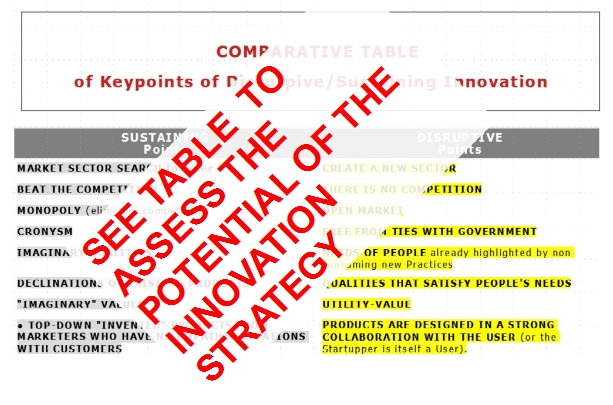
Today we often fall into a fatal misunderstanding: to think that whoever is a successful big company today has followed the rules of the nascent Market(of Disruptive innovation).
In reality, today we are living in a transition phase in which successful Companies that were born in a phase in which it was possible not to adopt the rules of Disruptive innovation and other Companies that are instead born developing an innovation effectively disrutpive coexist.
It is therefore necessary to learn to distinguish the Models, the Principles on which the Companies that currently hold dominant positions are based.
.
Today we have:
● Companies WHICH HAVE ACHIEVED SUCCESS THROUGH A DISRUPTIVE INNOVATION, that is, that they
have invented something literally new,
GOING TO MEET VITAL NEEDS OF CUSTOMERS.
Let’s see for example the case of Search engine, a sector in which Yahoo! was born when – as it is for the Disrutpive innovation business – the sector did not exist yet.
Yahoo! to succeed followed the path of the emerging market, Disruptive Innovation – at least a decade before the Disruptive Innovation Market was discussed
Also significant is the fact that Yahoo! then followed the reverse path: acquired by the financial business, the “Manager’s Business” – which applies principles practically opposed to those of disruptive innovation – was supplanted by other search engines.
.
● Companies which, although apparently very innovative, HAVE BEEN FOUNDED ON THE RULES OF THE PRE-DISRUPTION MARKET.
Google, the successor to Yahoo!, has instead followed the reverse path to that of Yhaoo! – has followed the Market Principles of the last decades. He placed himself as a Follower – with huge capital. And so he didn’t invent anything: he basically copied Yahoo improving “technical” performance (using very sophisticated servers).
The fact is that
the success of a company’s strategies
DEPENDS STRICTLY FROM THE MODEL
ON WHICH THE COMPANY HAS BEEN BASED
<see The great Firms are not able to develop disruptive innovation within them >
And Google is a significant example of how inexorable this law is: if with its Google model it has been able to impose itself in the past, then – despite having practically “infinite” capital at its disposal – it has always, without exception, failed any attempt to enter the market with a new product (throwing away bilions of dollars) [see the google graveyard here or here]
.
We must not therefore be deceived by the false concepts of Disruptive innovation <see The basic misunderstanding on Real (Disruptive) Innovation>
<see Decalogue of Rules of Disruptive innovation>
For example, technological innovation is not at all a Disrutpive innovation: that is, it is not able to develop successful products in the nascent market. <see Disruptive innovation is not based on technologies>
.
Ultimately,
Google cannot really succeed against StartUp
(which, as often happens) are based on Principles of Real Disruptive Innovation.
Not because the latter are more efficient. But simply because Companies like Google have a flaw in the handle: they are not founded on the principles of the new Disruptive Innovation Market.
<see Why the big companies cannot innovate within them [1]>
The criticality of the Big Companies born on a non-disruptive basis
Google (and other big Companies)
continue to maintain the Market Leadership
thanks to the strategies of
the “traditional” Market of the last decades.
Substantially thanks:
● to the condition of monopoly by it created, and
● to “interaction” with political forces.
.
However, we must consider that
the increasing demand for Disrtuptive innovation
by New Demand
places Companies like Google in a highly critical position.
<see Why disruptive innovation is not an option>
In particular, for Google, one of the major problems could derive from the fact that it was unequivocally aligned with a specific political part. And it applies a very strong censorship according to criteria that are often badly tolerated by the public (both as for web searches and for the publication of videos on YouTube).
This approach exposes Google to the risk of seeing competitors appear who exploit the users’ dissatisfaction (Google, by favoring politically openly against the Market, can cause an important part of the business to descend into the field).


